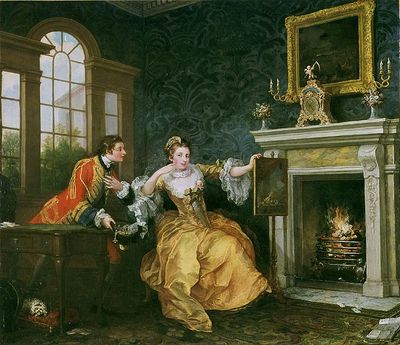Annotation:Ladies Last Stake (The): Difference between revisions
No edit summary |
No edit summary |
||
| (5 intermediate revisions by 2 users not shown) | |||
| Line 1: | Line 1: | ||
---------- | |||
---- | {{TuneAnnotation | ||
|f_tune_annotation_title= https://tunearch.org/wiki/Annotation:Ladies_Last_Stake_(The) > | |||
'''LADIES LAST STAKE, THE.''' English, Country Dance Tune and Jig (6/8 time). D Major. Standard tuning (fiddle). AA'B. The tune, and accompanying dance steps, appeared in all four volumes of London publisher John Young's '''Second Volume of the English Dancing Master''' [http://www.izaak.unh.edu/nhltmd/indexes/dancingmaster/Dance/Play5636.htm] (1710-1728), and in John Walsh's '''The Second Book of the Compleat Country Dancing-Master''' (London, 1719). | |f_annotation='''LADIES LAST STAKE, THE.''' AKA and see "[[Silence]]." English, Country Dance Tune and Jig (6/8 time). D Major. Standard tuning (fiddle). AA'B. The tune, and accompanying dance steps, appeared in all four volumes of London publisher John Young's '''Second Volume of the English Dancing Master''' [http://www.izaak.unh.edu/nhltmd/indexes/dancingmaster/Dance/Play5636.htm] (1710-1728), and in John Walsh's '''The Second Book of the Compleat Country Dancing-Master''' (London, 1719). | ||
<br> | <br> | ||
<br> | <br> | ||
'''The Ladies Last Stake; or The Wives Resentment''' (1707) is a play by Colley Ciber [http://en.wikipedia.org/wiki/Colley_Cibber] (1671-1757), one of twenty-five the actor-playwright wrote for his company at Drury Lane. Wikipedia says of the play: | '''The Ladies Last Stake; or The Wives Resentment''' (1707) is a play by Colley Ciber [http://en.wikipedia.org/wiki/Colley_Cibber] (1671-1757), one of twenty-five the actor-playwright wrote for his company at Drury Lane. Wikipedia says of the play: | ||
[[File:stake.jpg|400px|thumb|right|The Ladies Last Stake, by William Hogarth (c. 1757)]] | |||
<blockquote> | <blockquote> | ||
''The Lady's Last Stake (1707) is a rather bad-tempered reply to critics of Lady Easy's wifely'' ''patience in The Careless Husband. It was coldly received, and its main interest lies in the'' ''glimpse the prologue gives of angry reactions to The Careless Husband, of which we would'' ''otherwise have known nothing (since all contemporary published reviews of The Careless Husband'' ''approve and endorse its message). Some, says Cibber sarcastically in the prologue, seem to think'' ''Lady Easy ought rather to have strangled her husband with her steinkirk:'' | ''The Lady's Last Stake (1707) is a rather bad-tempered reply to critics of Lady Easy's wifely'' ''patience in The Careless Husband. It was coldly received, and its main interest lies in the'' ''glimpse the prologue gives of angry reactions to The Careless Husband, of which we would'' ''otherwise have known nothing (since all contemporary published reviews of The Careless Husband'' ''approve and endorse its message). Some, says Cibber sarcastically in the prologue, seem to think'' ''Lady Easy ought rather to have strangled her husband with her steinkirk:'' | ||
| Line 16: | Line 17: | ||
</blockquote> | </blockquote> | ||
</blockquote> | </blockquote> | ||
"Ladies Last Stake" was printed under the title "[[Silence]]" in London music publisher Thomas Straight's '''24 Country Dances for 1783''' (p. 6). | |||
|f_source_for_notated_version= | |||
'' | |f_printed_sources=Young ('''The Second Volume of the Dancing Master, vol. 1'''), 1710; p. 147. | ||
|f_recorded_sources= | |||
|f_see_also_listing= | |||
}} | |||
Latest revision as of 23:59, 3 July 2023
X:1 T:Ladies Last Stake, The M:6/8 L:1/8 R:Country Dance B:Young – Second Volume of the Dancing Master, 1st edition (1710, p. 147) K:D f/g/|afd ecA|d3 A2=c|BAG gBe|1 c3-c2:|2 D3-D2:|| c/d/|ecA ecA|a3 e2f|ecA AB^G|A3-A2 F/G/| AFD BGE|c3 d2 f/g/|afd dec|d3-d2||
LADIES LAST STAKE, THE. AKA and see "Silence." English, Country Dance Tune and Jig (6/8 time). D Major. Standard tuning (fiddle). AA'B. The tune, and accompanying dance steps, appeared in all four volumes of London publisher John Young's Second Volume of the English Dancing Master [1] (1710-1728), and in John Walsh's The Second Book of the Compleat Country Dancing-Master (London, 1719).
The Ladies Last Stake; or The Wives Resentment (1707) is a play by Colley Ciber [2] (1671-1757), one of twenty-five the actor-playwright wrote for his company at Drury Lane. Wikipedia says of the play:

The Lady's Last Stake (1707) is a rather bad-tempered reply to critics of Lady Easy's wifely patience in The Careless Husband. It was coldly received, and its main interest lies in the glimpse the prologue gives of angry reactions to The Careless Husband, of which we would otherwise have known nothing (since all contemporary published reviews of The Careless Husband approve and endorse its message). Some, says Cibber sarcastically in the prologue, seem to think Lady Easy ought rather to have strangled her husband with her steinkirk:
Yet some there are, who still arraign the Play,
At her tame Temper shock'd, as who should say—
The Price, for a dull Husband, was too much to pay,
Had he been strangled sleeping, Who shou'd hurt ye?
When so provok'd—Revenge had been a Virtue.
"Ladies Last Stake" was printed under the title "Silence" in London music publisher Thomas Straight's 24 Country Dances for 1783 (p. 6).

